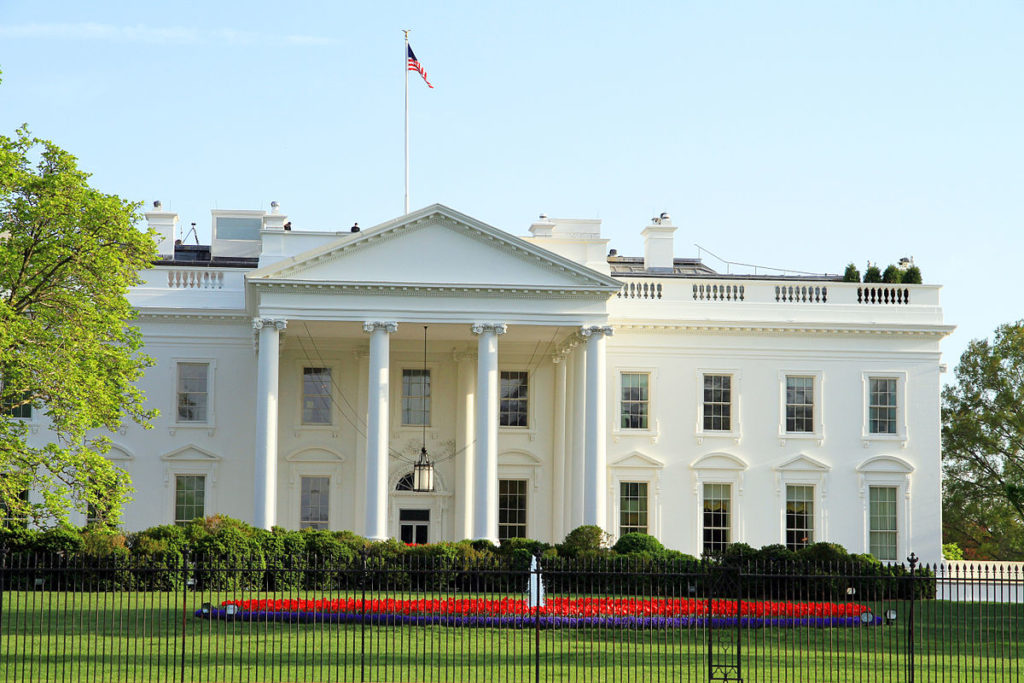Politics & Government
Critics Say New Capitol Parks Rules Would Curb Free Speech
Co-published by Newsweek
A plan proposed by the National Park Service would nearly seal off the area surrounding the White House, with only a five-foot-wide stretch of sidewalk remaining open to the public.

Co-published by Newsweek
The Trump administration is seeking to limit protests on the National Mall in Washington, DC and in nearby city parks and squares in new rules the National Park Service has proposed in the Federal Register. The parks service argues the regulations are just a routine update. But many opponents see them as an attempt to curb the rights of Americans to assemble and speak out at the very monuments that proclaim the nation’s uniqueness as a free and democratic country.
The proposed regulations’ largest impact is likely to be felt at the White House, where Americans have historically made their voices heard on national issues. The plan would nearly seal off the area surrounding the presidential residence, with only a five-foot-wide stretch of sidewalk remaining open to the public.
The suffragettes who stood in front of the White House in 1917 demanding the vote for women would have been hard-pressed to fit in the tiny space now proposed to be available to the public. More recently, the 2014 demonstration against the Keystone XL oil pipeline, where hundreds of people were arrested after locking themselves to the White House fence with plastic zip ties, would have been impossible under the proposed rules.
“The symbolic value of getting arrested on the sidewalk was very powerful for them,” Arthur Spitzer, legal co-director of the American Civil Liberties Union of Washington, DC said of the Keystone protesters.
Some areas around the White House have already been temporarily closed to foot traffic in response to “fence jumpers” who have attempted to enter the White House grounds. The new rules would make those closures permanent, even though jump-proof fencing was recently installed.
The government’s proposals would effectively ban stages and sound systems for spontaneous demonstrations like those that erupted in response to the Trump administration’s travel ban or against the administration’s policy of separating children from their parents at the U.S.-Mexico border, because permits would be required for their use.
In an email, Brent Everitt, a National Park Service spokesman, said the new rules were proposed to address newer monuments, like the Korean War Veterans Memorial, the Vietnam Veterans Memorial and the Martin Luther King, Jr. Memorial, which were built since the rules were last revised. (For the most part, the ACLU has not taken issue with those proposals.)
He argued that changes to White House rules were made in response to a request by the Secret Service. Everitt also commented that another change, a permit requirement for structures built in some Washington parks, “are in reaction to events that occurred since the last update,” namely, the Occupy protests in McPherson Square, whose makeshift buildings “created health and safety hazards for participants and for the city at large.”
Many of the government’s proposed rules would violate the Constitution, the ACLU contends in its formal comments on the changes.
“…the amendments now proposed harken back to the era in which the courts had to be called upon to protect the right to dissent in the nation’s capital,” the organization wrote, noting that some of the newly proposed regulations would also violate court orders issued in previous ACLU cases and which are currently in effect.
The ACLU is among more than 38,000 groups and individuals that have weighed in on the proposals during a 60-day comment period that ended October 15. The civil liberties group charges that the limit on protests on the sidewalk facing the White House is a “stealth proposal” because it is buried at the end of the 26-page rules document; no discussion of it is included in the Federal Register publication of why the rule is necessary.
Spitzer said the provision appears to be a response to White House annoyance with protesters.
“That’s my suspicion,” Spitzer said. “I do know that no one in the National Park Service was working on this until the Trump administration came to power.”
The administration is also requesting public comment on charging demonstrators for permits to recover government costs for large events. It has not formally proposed charging fees, but the ACLU said in its comments that doing so would amount to “charging Americans a fee to exercise their constitutional rights.” The 1963 March on Washington in which Martin Luther King, Jr. gave his I Have a Dream speech likely would have been impossible, the ACLU contended, had the government been able to recover its costs for the event.
The government is legally obligated to read and consider all public comments before its rules go into effect. But, if final regulations, such as those proposed are published, “The green light would be on for lawsuits on behalf of people who want to demonstrate,” Spitzer said.
Copyright Capital & Main

-

 Column - State of InequalityJanuary 29, 2026
Column - State of InequalityJanuary 29, 2026Are California’s Billionaires Crying Wolf?
-

 Latest NewsFebruary 3, 2026
Latest NewsFebruary 3, 2026Amid the Violent Minnesota Raids, ICE Arrests Over 100 Refugees, Ships Many to Texas
-

 Dirty MoneyJanuary 30, 2026
Dirty MoneyJanuary 30, 2026Amid Climate Crisis, Insurers’ Increased Use of AI Raises Concern For Policyholders
-

 Featured VideoFebruary 4, 2026
Featured VideoFebruary 4, 2026Protesters Turn to Economic Disruption to Fight ICE
-

 The SlickFebruary 2, 2026
The SlickFebruary 2, 2026Colorado May Ask Big Oil to Leave Millions of Dollars in the Ground
-

 Column - State of InequalityFebruary 5, 2026
Column - State of InequalityFebruary 5, 2026Lawsuits Push Back on Trump’s Attack on Child Care
-

 Column - California UncoveredFebruary 6, 2026
Column - California UncoveredFebruary 6, 2026What It’s Like On the Front Line as Health Care Cuts Start to Hit
-

 The SlickFebruary 10, 2026
The SlickFebruary 10, 2026New Mexico Again Debates Greenhouse Gas Reductions as Snow Melts

